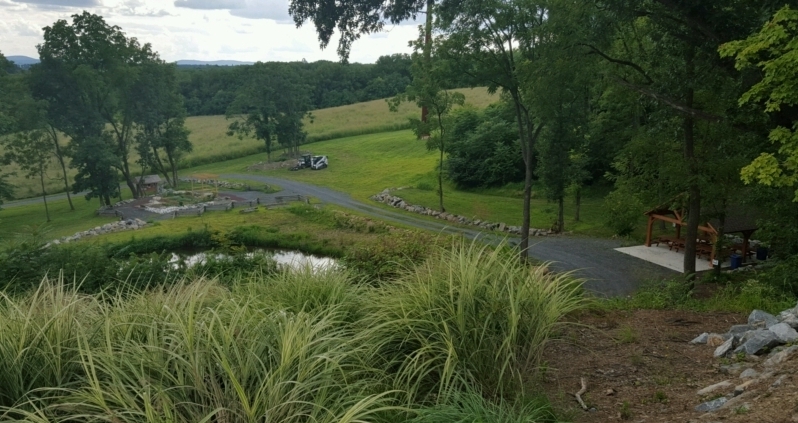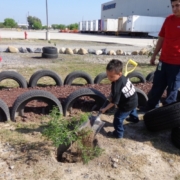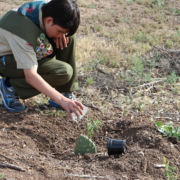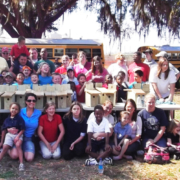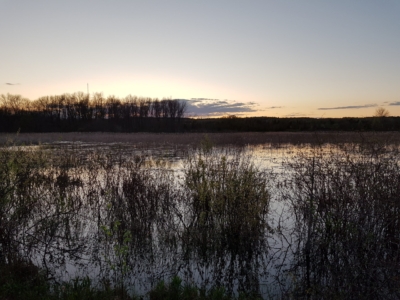Buzzi Unicem | Building a Legacy of Environmental Stewardship through Education and Collaboration
Conducting conservation work in a quickly developing region can pose unique challenges, but also creates opportunities for companies to connect with new residents — to teach them about an area’s industrial and environmental histories while also making them a part of the region’s future.
Hercules Cement Company, owned by Buzzi Unicem USA, operates the Stockertown Plant in the Lehigh Valley, an area between Philadelphia and New York City that is Pennsylvania’s fastest-growing region. The area once produced 60% of the world’s cement and today is still home to many longstanding cement companies (the Stockertown Plant commenced production in 1916). Bushkill Creek, a tributary of the Delaware River, runs through the 700-acre site, which also features a feeder creek and pond, meadowland, forestland, and fruit and chestnut trees. These habitats serve as the backdrop for a myriad of educational and outreach activities which, from the beginning, have been led by Environmental Manager Keith Williams, who works alongside business consultant Sally Handlon, president of Handlon Business Resources, LLC.
Keith’s family has deep ties to the Lehigh Valley and to industry in the region, and they instilled environmental stewardship in him at an early age — Keith recalls that his father taught him about CO2 emissions in the 1950s, decades before it was a focus of the environmental movement. Keith also cites his high school, which featured an environmental laboratory, as an influence. He views the opportunity to teach today’s youth about the environment as a “full-circle” experience, saying that “the reward is in seeing young people believe in environmental stewardship and practice it on their own.”
The Stockertown Plant’s educational programming was initiated in 2009, when local legislators, educators and environmental groups were invited on-site for a tour and a discussion of how the site’s pond and creeks could be used for lessons about water. AP Environmental Science and Biology students now regularly visit the site to conduct activities like water quality analyses, soil comparisons and planting events. Sally says that the Stockertown team “wants students to understand environmental impacts beyond what a textbook could teach them. We know that everybody, on an individual level, can do something to help the environment — we want students to get that one something from us.”
In 2013, the Stockertown team held another site tour, this time, to solicit external input on their plans to convert former farmland into a biodiverse meadow. Planting within this habitat, known as the Hercules Meadow, started later that year. In 2014, the team worked with the American Chestnut Foundation, whose mission is to reestablish chestnut populations across the eastern U.S., to plant the only chestnut orchard in the county. These chestnuts and other tree species have provided habitat for animals like deer, bears, beavers, wild turkeys and foxes, and the meadow’s wildflowers attract many pollinators. The meadow also contains expanses of switchgrass, a low-maintenance, deep-rooted and long-living native grass known for its carbon sequestration properties. Every year, the grass is harvested and used as biofuel in the cement plant, reducing the facility’s carbon emissions; the self-seeding species then grows back the following year.
Students have assisted with habitat construction through tree planting and nest box construction events; 70-80% of students have stated that these on-site experiences marked their first time partaking in such activities. As promoting STEM careers is a goal of the Stockertown team, Keith and Sally have been pleased to see many of the students pursue environmental science and other STEM fields in college, with some returning to work for the company during summer breaks. Keith also notes that the field trips provide an opportunity for students, many of whom are new to the area, to learn about local history. After visiting the site, these students often tell their families about the facility, its deep roots in the Lehigh Valley and its commitment to environmental stewardship, helping the plant secure social license to operate among new residents.
The conservation program has also strengthened ties within the company: between corporate leadership and plant management and between plant management and hourly employees. Keith says, “I’m very encouraged by Buzzi Unicem’s perspective — the company doesn’t look at conservation from a traditional ROI approach. It’s looking at these efforts as being an important part of the community, creating working relationships between employees. When I ask for corporate support for the program, the support is always there.”
The meadow is frequented by the plant’s Rod and Gun Club, a popular organization among the site’s union employees. These hunters help the team with population management as needed and have been happy to see the habitat flourish. “That’s something you can’t put a dollar value on,” Keith says, “When a company is committed to improving employee relations, these types of projects can move them toward that goal.”
Earlier in 2021, the plant hosted an event with the Pennsylvania Farm Bureau, attended by local farmers and government officials, and would like to host similar events moving forward, and to continue expanding outreach efforts. Buzzi is also considering a plan to collaborate with the Rodale Institute on an organic farming project and donate the crops to a local food bank.
After being unable to visit the site since early 2020, local schools are looking to return to the Hercules Meadow in 2022. In the meantime, the Stockertown team is considering virtual learning options, like the development of an educational video. Sally explains that maintaining relationships with schools, even when site visits aren’t possible, has been key to the project’s longevity. Even before the pandemic, factors like state testing schedules could make it hard to book field trips. She says, “When this happens, we continue to have conversations with teachers on an ongoing basis, provide them with updates on environmental issues and ask for their feedback on past on-site experiences.”
With this commitment to long-lasting partnerships, plus a passion for legacy-building and innovative nature-based solutions, the Buzzi Unicem team’s impact on biodiversity and on Lehigh Valley residents is primed to keep growing.
Related Content
Blogs:
- 6 Ways to Protect Your Local Watershed
- Back to School: Partnering with Local Schools to Strengthen Your Certification Program
- The Carbon-Sequestering Power of Soils
- Habitat Design that Invites Exploration
- Hands-On Means Minds-On
- The Importance of Aligning Your Projects with Learning Standards
- Lawn to Woodland: Try This, You’ll Like It!
- Let’s Go Outside! The Benefits of Learning in the Outdoors
Webinars:
- Best Practices for Education Programming at Corporate Sites
- Getting Buy-In From the Top: How to Gain Approval for Conservation Projects
- How to Select the Best Lessons for Your Education Projects
- Joining the Dots: Operationalizing Intent for Impact
- Key Tactics for Healthy Soils to Benefit People, Plant and Your Bottom Line
- STEM Learning in Your Habitat
- Water Conservation and STEM: Turning Students into Water Stewards
Project Guidances:
White Papers:
- Corporate Citizenship and STEM Education
- Leveraging the Power of Nature
- Native Grasslands Conservation
Quick Facts
| Site Name: | Stockertown Plant |
|---|---|
| Category: | Member Spotlight |
| Tags: | Awareness and Community Engagement, formal learning |
| Site Location: | Stockertown, Pennsylvania |
| Partners: | American Chestnut Foundation, Edge of the Woods Native Plant Nursery, ForestLand LLC, Nazareth Area School District, Northampton Area School District, Northampton County Water Conservation District, Pen Argyl School District |
| Project Types: | Awareness and Engagement, Formal Learning |
| Certification Since: | 2013 |
| Certification Level: | Silver Certified |
| WHC Index Link: | Learn more about this program |
